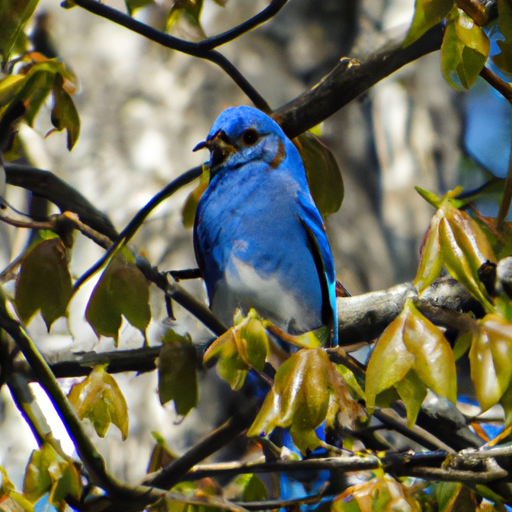Imagine waking up to the delightful melodies of birds chirping in the stillness of the early morning. Have you ever wondered what motivates these feathered singers to herald the dawn with their joyful tunes? In this article, we will unravel the mystery behind what makes birds sing in the morning.
From scientific explanations to poetic interpretations, we will explore the captivating reasons behind this enchanting phenomenon. So, grab a cup of coffee, settle into your favorite chair, and prepare to be mesmerized by the magical world of bird songs.
Internal Factors
Hormonal Changes
Birds produce and release hormones that regulate their singing behavior. During the breeding season, their hormone levels fluctuate, particularly testosterone. This increase in testosterone triggers the desire to sing and attract mates. As the sun rises, the birds’ hormone levels reach their peak, leading to more energized singing in the morning.
Circadian Rhythm
Just like humans, birds have an internal clock called the circadian rhythm. This internal clock helps regulate their daily activities, including singing. As daylight approaches, the birds’ internal clock signals them to start their day and engage in various behaviors, including singing. This innate response is strongly influenced by the natural light-dark cycle and is an integral part of their daily routine.
Social Communication
Birds use their songs as a means of communication with other members of their species. Singing in the morning allows them to establish contact with potential mates and maintain social bonds within their flock or community. It acts as a form of social expression, conveying their presence, intentions, and territory.
Territorial Defense
Singing in the morning also serves as a territorial display for many bird species. By singing from strategic locations within their breeding territories, birds establish their presence and ward off potential intruders. This vocal proclamation announces their ownership of the area and warns other birds to stay away. It ensures that they have exclusive access to resources, such as food and nesting sites, which are essential for successful breeding.
Environmental Factors
Dawn Chorus
One of the prominent factors that influence morning singing is the phenomenon known as the dawn chorus. The dawn chorus refers to the simultaneous singing of multiple bird species at the break of dawn. This cacophony creates a rich auditory environment, enticing birds to join in and contribute to the chorus. It creates a sense of safety in numbers and enhances their collective anti-predator strategies.
Availability of Food
Mornings bring about increased foraging opportunities for birds. Insects, worms, and other small prey become more active during the early hours, providing a plentiful food source. Singing in the morning helps birds attract potential mates and also acts as a signal to locate food-rich areas. By establishing their presence through song, birds can navigate and find available food resources efficiently.
Weather Conditions
Mornings often provide ideal weather conditions for birds to sing. The air is typically cooler and less turbulent, allowing songs to carry further distances without distortion. Additionally, the morning air tends to be less congested with scents and sounds, reducing interference and improving the clarity of their songs. Birds take advantage of these favorable conditions to maximize their communication range and broadcast their melodies effectively.
Reproductive Purposes
Attracting Mates
One of the primary reasons birds sing in the morning is to attract a mate. Their vocal performances are meant to captivate potential partners and demonstrate their fitness as reproductive partners. Male birds often sing complex melodies and display impressive vocal skills to showcase their genetic quality and overall health. The early morning hours create a prime opportunity for males to showcase their attributes and woo prospective females.
Establishing Territories
Birds use their songs to establish and defend their territories. Singing in the morning enables them to mark their boundaries, deterring neighboring birds from encroaching upon their breeding space. The clarity of the morning air allows their songs to travel longer distances, maximizing the effectiveness of territory establishment. By vocalizing their presence, birds minimize physical confrontations, reducing the risks associated with territorial disputes.
Announcing Readiness to Breed
Singing in the morning serves as an announcement of readiness to breed for both males and females. By vocalizing their reproductive condition, birds can assess the mating potential of others within their vicinity. They can also identify suitable breeding partners based on the quality and complexity of their songs. This communication helps ensure successful breeding encounters and allows birds to make informed decisions regarding potential mates.
Optimal Singing Time
Reduced Noise Pollution
Morning hours typically exhibit lower levels of ambient noise compared to later parts of the day. Human activities, such as traffic and industrial noise, are generally at a minimum during this time. By singing in the morning, birds can take advantage of this relative silence, reducing the competition between their songs and external sounds. This enhanced acoustic environment allows their melodies to be heard clearly and improves the effectiveness of their communication.
Increased Visibility
The early morning sunlight offers optimal lighting conditions for visual displays. Singing birds often accompany their vocal performances with physical movements like fluffing feathers, fanning tails, or engaging in elaborate dances. These displays are more visually striking when illuminated by soft golden morning light, making it easier for other birds to observe and interpret the signals being conveyed. Singing during this time maximizes the visibility and impact of their displays.
Cooler Temperature
Mornings provide relatively cooler temperatures compared to the rest of the day, especially during the summer months. This lower temperature reduces the metabolic demands on birds, allowing them to sing with less energy expenditure. Singing in the morning prevents overheating and conserves energy for other essential activities throughout the day, such as foraging and reproductive efforts.
Predator Absence
Many predators are less active during the early morning hours, providing a safer period for birds to vocalize. By singing before predators become more active, birds reduce their vulnerability to potential attacks. Singing in the morning allows them to communicate and establish their presence without attracting excessive attention from predatory threats. It provides a window of opportunity when birds can focus on their reproductive efforts with minimal risk.
Species-Specific Singing
Unique Melodies
Each bird species has its own unique melodies, ensuring individuality and enhancing species recognition. By singing species-specific melodies, birds can communicate their identity to others, establishing their presence and preventing confusion with other species. The distinct melodies also provide a basis for mate selection, as birds can identify potential partners capable of producing offspring with strong genetic traits.
Distinct Vocalizations
Apart from melodies, birds utilize a range of distinct vocalizations to convey specific messages. These include alarm calls, courtship calls, and contact calls, all serving different purposes within social and reproductive contexts. The morning provides an excellent opportunity for birds to engage in these vocalizations, as the clearer acoustic environment and reduced noise pollution enable effective transmission and reception of these distinct sounds.
Learning from Parents
Many bird species learn their songs from adult members of their own species, usually their parents. Young birds listen and imitate the vocalizations of adult birds, gradually perfecting their own abilities over time. By starting their day with singing, adult birds create an environment conducive to this learning process. Young birds have a chance to observe and absorb the melodies and vocalizations, refining their skills and ultimately maintaining the cultural traditions of their species.
Cultural Transmission
Birds also transmit certain vocal behaviors across generations, resulting in unique regional dialects among populations. These dialects are influenced by the environment, social interactions, and learning from local individuals. Mornings play a vital role in cultural transmission, as the songs sung during this time by established members of the population become the reference points for young birds to learn and continue the specific vocal traditions of their region.
Predawn Preparation
Vocal Warm-up
Just as humans warm up their vocal cords before singing, birds engage in vocal warm-up exercises. Before the onset of the dawn chorus, birds often produce soft, quiet vocalizations as a way to loosen their vocal muscles. These initial vocalizations gradually increase in volume and intensity, preparing their vocal apparatus for the full-on singing session that ensues with the rising of the sun. This warm-up period enables birds to produce strong and clear sounds during the peak of their morning performance.
Territory Marking
Before the day begins, birds engage in territory marking using vocal displays. Singing from their chosen locations within the territory, they signal their ownership and defend their boundaries against intruders. Through these territorial songs, birds establish their presence and ward off potential competitors. By marking their territory in the predawn hours, they set the stage for the morning chorus and maintain control over their breeding space.
Establishing Hierarchy
In some bird species, morning singing serves as a hierarchical display within the flock or community. Established dominant individuals often initiate the chorus, filling the morning air with their powerful vocalizations. Other birds in the group respond by singing in a descending order of dominance, acknowledging the hierarchical structure. This vocal exchange establishes and reinforces the social order, ensuring clarity and organization within the flock or community.

This image is property of images.unsplash.com.
Learning and Development
Song Learning Period
The learning period for birds’ songs occurs early in their lives. Young birds typically learn by imitating the songs of adult birds during a critical developmental phase. This learning period often coincides with the time when mornings are filled with intense singing activity. The abundance of vocal mentors and the regularity of morning singing create an immersive learning environment that allows young birds to incorporate the subtleties and nuances of their species’ songs into their own repertoire.
Imitation of Adults
During the song learning period, young birds closely observe and imitate the vocalizations of adult birds within their social group or family. The morning chorus provides a rich source of diverse songs sung by experienced singers. Young birds learn the correct patterns, pitches, and rhythms, integrating these elements into their own developing songs. The melodies and vocal styles they acquire become a part of their individual identity and contribute to the overall diversity of the species’ vocal repertoire.
Individual Variation
While young birds learn from adult singers, they also put their own twist on the songs they imitate. This leads to individual variation in the songs produced by each bird. Morning singing facilitates this individualization process as birds experiment with different variations and practice their skills. The morning chorus allows for a collective display of unique interpretations of species-specific songs, creating a symphony of individuality within the larger group chorus.
Benefits and Functions
Enhancing Individual Fitness
By singing in the morning, birds actively engage in behaviors that enhance their individual fitness. Vocal performance contributes to male birds’ success in attracting mates, leading to increased reproductive opportunities. It also allows birds to establish and defend territories, ensuring access to essential resources vital for their survival and the successful raising of offspring. Morning singing, therefore, plays a crucial role in maintaining and maximizing their individual reproductive success.
Group Cohesion
The morning chorus fosters a sense of cohesion and unity within bird communities. By synchronizing their vocal performances, birds establish a collective identity and strengthen the social bonds among group members. The harmonious chorus creates a shared experience that instills a sense of belonging and cooperation. Group cohesion is vital for coordinated defense against predators, enhanced foraging efficiency, and effective communication within the community.
Identifying Home Range
Morning singing enables birds to establish aural landmarks that help them identify and navigate their home range. By learning the unique songs of neighboring individuals or distinct regional dialects, birds develop a mental map of their surrounding environment. They can detect changes in the vocal landscape, identify intrusions into their territory, and adjust their behavior accordingly. This vocal mapping facilitates efficient territorial defense and allows birds to optimize their use of available resources within their familiar surroundings.
Warning Signals
The morning chorus also serves as an early warning system for birds. By listening to the songs of their fellow avian neighbors, birds can detect the presence of potential threats or predators. Any change in the normal chorus may indicate the presence of a predator nearby. Birds quickly interpret these alarming variations in the soundscape and adjust their behavior to minimize the risks posed by predators. The collective vigilance of the morning chorus provides an added layer of protection for the entire bird community.

Evolutionary Advantage
Sexual Selection
Birdsong has long been recognized as an important factor in sexual selection. Males with more elaborate and complex songs are often preferred by females, as these songs are indicative of genetic quality and overall fitness. Through generations of mate selection based on song quality, birds with superior vocal abilities have a greater chance of passing on their genes. Morning singing, therefore, offers a crucial opportunity for males to showcase their vocal prowess, increasing their chances of successful reproduction.
Natural Selection
Birdsong is subject to natural selection pressures, shaping the songs and vocal behaviors of different bird species. The ability to sing effectively and attract mates is advantageous for reproductive success. Birdsong can also function as a signal of a bird’s overall health, vitality, and adaptability to its environment. Through the processes of natural selection, the songs and vocalizations of birds have evolved to fit their ecological niches and adapt to their specific environmental conditions.
Survival Strategies
Morning singing contributes to birds’ overall survival strategies, providing several advantages. By establishing and defending territories, birds secure access to resources needed for their survival and reproductive success. Singing also enables birds to communicate their presence and maintain social bonds within their flock or community, ensuring collective protection and improved foraging efficiency. The various functions of morning singing have evolved as adaptive strategies for birds to thrive in their respective habitats.
Effect of Urbanization
Altered Singing Patterns
Urbanization and human activities have had a significant impact on bird behaviors, including their singing patterns. In urban areas, the presence of artificial light sources can disrupt the natural light-dark cycle, leading to changes in the timing and duration of morning singing. Additionally, the presence of anthropogenic sounds, such as traffic noise, can mask or interfere with the birds’ songs. These alterations in singing patterns can affect communication, breeding success, and overall behavior of birds in urban environments.
Noise Interference
Urban settings are often associated with high levels of noise pollution, which can negatively impact bird communication. Excessive noise from human activities, such as construction, traffic, and industrial processes, can mask or distort bird songs, making it difficult for birds to effectively transmit and receive their vocal messages. Noise interference can disrupt mate selection, territorial defense, and social bonding, leading to decreased reproductive success and overall population health.
Disruption of Communication
The dense concentration of buildings and infrastructure in urban areas leads to reduced visibility and accessibility among bird populations. Birds rely on visual cues and familiar landmarks to communicate and navigate their surroundings. The presence of tall buildings and limited open spaces disrupts the natural landscape, making it harder for birds to establish and maintain social interactions. This disruption of communication can negatively impact their social structures, breeding behaviors, and overall well-being in urbanized environments.

